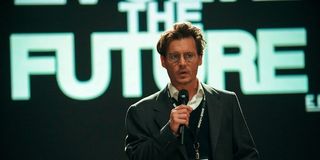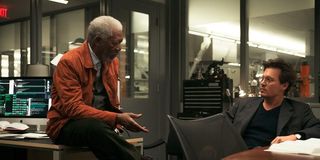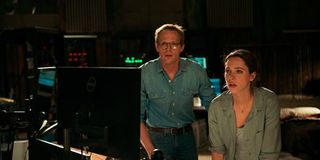Transcendence Director Explains The Twist Ending

The new science-fiction thriller Transcendence asks a lot of big questions. Is it morally right to upload a consciousness into a computer? Does something define its own sentience? Given the power of a god, would human nature reveal itself to be a positive force, or Hobbesian-esque evil? It’s a lot to take on for a filmmaker, particularly one that has never directed a feature before, but it was something that Wally Pfister put a great deal of thought into while making the new movie.
Before Transcendence arrived in theaters this past weekend, I had to great opportunity to sit down one-on-one with the director to talk all about the philosophy and filmmaking behind his directorial debut. He had a lot of fascinating things to say about the movie, so read on!
Warning: The following feature has a good number of spoilers for Transcendence, so if you haven’t seen the movie and don’t want it to be ruined for you, I recommend heading back here.

Why It Had To Be Johnny Depp
At this stage in his career, Johnny Depp is well known for taking on bizarre roles, but Transcendence offers him one of his strangest yet. While he does get to play a human for the first 20 minutes of the movie, most of the film has his character, Dr. Will Caster, communicating from behind a computer monitor. The part is a strange one for an A-list actor, but Pfister had an explanation for why Depp was, in the director’s own words, the perfect choice for the role.
"He’s a very intelligent man and understood everything that was going on," Pfister told me when I asked about the casting choice. "We had wonderful conversations about what this machine was doing and tipping the hat and then not tipping the hat. So, having this sort of manipulation over where this character was going."
More than being just about subtlety, however, the filmmaker also needed an actor with the kind of charisma that could not only influence the movie’s audience to be on his side, but also characters in the story as well.
CINEMABLEND NEWSLETTER
Your Daily Blend of Entertainment News
"You want that connection with this guy first, with this professor," the director explained. "You can see the connection he has to his followers - and let’s think of them as followers, right? So, if this guy becomes this massive machine and he starts playing God, he’s got people following him partially because he has that charisma. Johnny Depp the actor was perfect for this movie and Johnny Depp the person was perfect for this movie. So, you know, I couldn’t have had better luck in casting."

Pfister Had To Earn His Big Twist Ending
A twist ending needs to be earned. Dropping a big surprise into the end of a story with zero build up is tremendously unsatisfying for an audience and considered rather lazy on the screenwriting end of things. On the other hand, keeping movie-goers guessing from beginning to end not only rewards them with an unexpected finish, but also gives the story more value on rewatch. Wally Pfister was all too mindful of this setting up the big ending of Transcendence, and found balancing the good and evil of technology as his gateway towards his twisty conclusion.
"By the end of the movie you’re asking this question, ‘Is this machine evil? Is this machine hell-bent on destroying the world?’" Pfister said. "Everything he does is for her. What I want people to do is not to take a side, but to be confused as to what side they should be on - because they want to take a side."
As for Pfister’s own conclusions about the science of artificial intelligence and the approach of the singularity, the director explained that all that really matters is the person controlling it. "If we’re asking what I’m concluding in the film, it’s probably the conclusion is that technology can be used or can be used for bad, depending on whose hands it’s in."

The Modern Movie Has A Heavy ‘70s Influence
Back in the mid-1980s and early 1990s we saw a boom of sci-fi thrillers warning of the dangers of advancing computers and technology. In a time when personal computers were starting to become a big thing, films like The Terminator, WarGames, The Lawnmower Man and Virtuosity all presented terrifying visions of machinery gone wrong. While Transcendence may seem like its harkening back to that particular era, Wally Pfister was actually more looking back at the sci-fi thrillers of the 1970s.
"What I really took from that era, and wasn’t just sort of machines and man and that sort of thing. It’s more about the classic science fiction staple of asking questions - asking a scary question. Asking a question that’s thought-provoking to people and generates conversation." Citing what he called "odd influences," the filmmaker said that he was looking to movies like 2001, Soylent Green and Westworld while making his directorial debut.
"I watched the first Terminator movie and loved it, but it wasn’t really, that wasn’t really a model for this film in any way… Whether it’s more B-movie kind of earlier stuff, you know, films from the ‘70s were more influential on what I was doing than films of the ‘80s."

The Fear Of The Machine Is Fear Of Ourselves
The idea of uploading a consciousness into a computer isn’t scary because of the thought of what the computer can do with access to the human mind. It’s scary because of the thought of what a human mind could do with access to infinite resources and information. It stretches back to a core fear of our own human nature and makes us question how that kind of power might corrupt us.
This is presented in an interesting way in Transcendence, because the consciousness being uploaded into the computer is one that belongs to one of the most brilliant minds on Earth. But what if deep down within him there is a point where true power strips him of his morality? This was something that Pfister thought long and hard about putting the film together.
"If we’ve actually uploaded a real consciousness and this contains the man’s emotions, what if he’s got a couple of screws loose? What if you’re uploading the consciousness of Ted Bundy? This could be a real potential problem," Pfister said laughing. "So that’s sort of the point of this as well. We’ve uploaded a consciousness. If we are concluding that it contains the soul, the malevolence, the benevolence of this particular person, then does that guide what he’s able to do with this power?"

And That Fear Can Be Blinding
At the end of Transcendence we discover that all of our perceived notions about Will’s intentions were wrong. While his actions may have seemed scary and immoral, everything he was doing was in hopes of making Evelyn’s vision of a perfect world become a reality. Nearly every character in the movie was blinded by their fear of the unknown, but perhaps the biggest culprit was Max, who believed in the technological advancement right up until it actually became a reality.
"Everything [Will is] doing is for her and that’s what it concludes in the end and that’s what Max sadly realizes," Pfister explained. "Everything he did was for her, and [Max] didn’t see it. He lost track."
Of course, Max wasn’t the only one with big questions, as Evelyn goes back and forth on whether or not it was the right choice to stick with Will and aid him in his evolution. "It’s an emotional and it’s a roller coaster ride for her. Her character is back and forth. Rebecca got that immediately and understood she had to be back and forth and back and forth, and we had to determine what side she was on."
Transcendence is in theaters now.

Eric Eisenberg is the Assistant Managing Editor at CinemaBlend. After graduating Boston University and earning a bachelor’s degree in journalism, he took a part-time job as a staff writer for CinemaBlend, and after six months was offered the opportunity to move to Los Angeles and take on a newly created West Coast Editor position. Over a decade later, he's continuing to advance his interests and expertise. In addition to conducting filmmaker interviews and contributing to the news and feature content of the site, Eric also oversees the Movie Reviews section, writes the the weekend box office report (published Sundays), and is the site's resident Stephen King expert. He has two King-related columns.

As Wait For Law And Order: Organized Crime's Return Continues, I Love One Night Court Star's 'Full Circle' Idea For Christopher Meloni Joining Season 3

Elizabeth Olsen Wasn't On Set For Agatha All Along’s Wanda Body Scene, But I Was Shook When The Hair And Makeup Leads Told Me How They Made It Look Like Her
Most Popular






